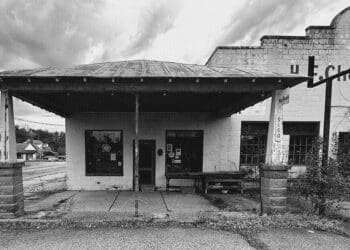As Jim Nortz explains, a boots-on-the-ground, eyeball-to-eyeball assessment can be a powerful and effective way to conduct first-party due diligence. After all, “there ain’t nothin’ like touchin’ and feelin’.”
Read Part 1 here.
In the early 1990s, I served as Senior Safety, Health and Environmental Counsel for a multinational specialty chemical company. A couple of years after joining the firm, Roger Sharp was hired and assumed the role of Senior Vice President of Operations. Roger was a giant of a man. Standing at 6’3” and weighing in at well over 350 pounds, he was a very imposing presence. Hailing from West Virginia, Roger spoke with a heavy drawl and carried himself like John Wayne – and it wasn’t an act.
To get acquainted with the company, shortly after his arrival, he went on a months-long tour of our chemical plants around the world. Upon his return, I popped in his office to welcome him back and asked him if he was worn out from all his travels. In response, Roger confessed that his global tour was taxing, but remarked, “there’s nothin’ like touchin’ and feelin’.”
Many years have passed since that conversation with Roger, but I have since learned the wisdom of his insights and have concluded that perhaps the single most effective means of mitigating Intermediary corruption risk is “first-party” due diligence.
First-party due diligence, as I use the term, refers to due diligence performed in person by company personnel of any potential intermediaries prior to commissioning their services. Ideally, such first-party due diligence should be performed by dedicated professionals who are highly trained, specialize in such work and have the requisite language skills and knowledge of the business climate in the locations where they are called on to perform such services. If you have the resources to recruit, train and deploy such a cadre of professionals and you retain a significant number of intermediaries in jurisdictions where corruption risks are high, it might be well worth the investment.
However, for many firms, it would be cost-prohibitive to implement such a program. For these firms, a far more practical strategy is to integrate first-party due diligence into routine business processes and to get your business colleagues “in the game.” The three key steps to executing such a strategy are detailed below.
1. Get Buy-in
The first and likely most difficult step in implementing an effective first-party due diligence program is to persuade your business leaders that one is necessary. In my experience, business professionals are very reluctant to adopt any processes that might slow them down or make their jobs more difficult. And since first-party due diligence will tend to slow the process of on-boarding new intermediaries, you will likely have your work cut out for you. If your firm is in the midst of a government investigation or enforcement action, you may have a “teachable moment” that will render this task a bit easier.
Otherwise, you’ll have to make the business case for implementing a first-party due diligence program and persuade your colleagues that it’s worth the investment. To do so, I recommend you go beyond the “scare treatment.” Seek to persuade your colleagues that kicking the tires hard before on-boarding new intermediaries will not only reduce corruption risks, but also help the business select intermediaries who will be able to serve the company well for the long-term, thus avoiding the costs and significant disruptions associated with terminating intermediary contracts.
In my experience, the best way to proceed is to start small. Connect with your business colleagues and see if you can find a regional or country manager who would be willing to participate in the development and implementation of a first-party due diligence pilot program. Work together with your colleagues to customize an approach that is not overly bureaucratic and that will serve their business needs. Use the lessons learned from the pilot program and your business allies to roll the program out to other parts of the company.
2. Develop a Due Diligence Protocol
To produce consistent results, work with your business partners to develop a practical but thorough process by which employees can determine the answers to the following three critical questions:
- Business Case: What business need or gap do we have that an intermediary can fill?
- Qualifications: Does the intermediary have the skills and capacity to deliver the required services to meet our business needs?
- Integrity: Does the intermediary have a genuine commitment to conducting business in accordance with the law and applicable ethical standards?
The specific areas of inquiry required to answer the questions detailed above will vary somewhat depending on the services the intermediary will be providing. For example, the questions you might ask a potential import/export broker will differ from those you would ask of an intermediary that you desire to distribute your products. The following are examples of areas of inquiry you might consider when performing first-party due diligence on a sales intermediary.
Business Case
Insisting that advocates for on-boarding a new Intermediary make the business case for doing so is essential. It not only assists the business in making rational choices, but also reduces the risk that company employees are advocating intermediaries for corrupt reasons. In addition to satisfying one of the three DOJ/SEC principles of due diligence, this seemingly obvious step ensures that the company does not go to the expense of performing due diligence and contracting with a new intermediary unless the anticipated benefits of doing so make good business sense.
Do not presume your business colleagues have a robust process for performing this analysis. If they do, great. If they do not, help them develop and implement one. The following is a sample of the kinds of questions Intermediary advocates should be required to answer to make the business case for on-boarding a new distributor or sales intermediary:
- What is the gap you are trying to fill with this new intermediary?
- How do they fill this gap?
- Is this a growth initiative or replacement of another intermediary?
- Why is this partnership mutually beneficial?
- What is the proposed sales territory?
- Are there any other intermediaries authorized for our company that cover the territory or perform this work? If yes, why can’t the other intermediaries in this territory cover the products/markets being proposed?
- What is the size of the market to be targeted by this intermediary?
- What value is expected to be gained in year one, two and three of the agreement with respect to revenue and market penetration?
- What are the expected discounts/commissions?
Qualifications
Presuming a sound business case can be made for on-boarding a new intermediary, the next question is, Can they do the job? As with the first area of inquiry, answering this question will both improve the chances that the business will get the services they seek and reduce the chances that company employees are advocating an intermediary for corrupt purposes. The following are examples of the kinds of questions that would serve this purpose:
- Which market segments do they currently serve?
- How does their primary customer base align with the gap we’re trying to fill?
- Do they have relationships with the key customers/market segment in their primary geography?
- Do they sell to multiple markets, or are they highly specialize in one segment?
- How many years have they been in business?
- How long have they been under current management?
- Do they sell to multiple markets, or are they highly specialized in one segment?
- What is their annual revenue?
- How many employees do they currently have?
- How many intermediary employees will be devoted to serving our needs?
- What are the qualifications/skill levels of the employees who will be assigned to our account?
- What is the geographic territory they cover?
- How many sales offices do they have, and where are they located?
- How many field salespeople do they have, and where are they located?
- How many application engineers/technical support people do they have, and what are their skill sets?
- Describe the intermediary candidate’s facilities (e.g., warehouse, office space, etc.).
- What facilities would be available to serve our company’s needs?
- Do they represent other competitive product lines? If yes, what are they, and how will channel conflict be managed?
- Do they represent other complimentary product lines? If yes, what are they?
- How competent are they with our technology?
Integrity
If a business need has been identified and the intermediary is qualified to meet that need, the final set of questions relate to whether the intermediary is committed to conducting business in accordance with the law and applicable ethical standards. The following is a sample of questions that might be asked to determine an intermediary’s commitment to integrity:
- Does the intermediary maintain audited financial records? (Inspect the books and records to determine if they satisfy intermediary contract requirements. Document your observations. If they do not have audited financial records, ask management whether they are willing to maintain such records in the future.)
- Are they willing to allow us to audit their books and records?
- Do they have an anti-corruption policy? If yes, obtain a copy.
- Do they act as their own payer, or do they utilize third-party payers? If yes, who is their third-party payer, and what is the business justification for using them?)
- Do they have a code of ethics aligned with the applicable industry code in the country? If yes, obtain a copy.
- Do they train their employees in compliance, ethics and laws? If yes, obtain a copy of training records.
- Are they willing to participate in a third-party due diligence process?
- Do they intend to sell our products to government agencies?
- Do they encounter corrupt practices in their accounts or in their market (bribe requests/unethical practices)?
- Do they think it is necessary to pay bribes to win business in their country?
- Have they ever paid bribes to government officials or others to win business?
- Are they willing to operate in accordance with all legal requirements and applicable industry ethics codes?
To perform this work, employees advocating a relationship with a new intermediary should meet face to face with the intermediary’s senior management team and employees and tour their facilities to seek answers to these kinds of questions. This basic, boots-on-the-ground, eyeball-to-eyeball due diligence should culminate in a written report that answers these and other relevant questions.
To reduce the burden associated with report writing, I strongly recommend you develop a template that is user-friendly with lots of check boxes and other similar time-saving features. All such first-party due diligence reports should then be presented to a multidisciplinary team for review. Ideally, this team would include the relevant business head, along with appropriate local or reginal finance, regulatory and legal professionals who are qualified to review such reports and who are, together, authorized to approve or disapprove proposals for new intermediaries. The due diligence reports and business decisions should be recorded in an electronic intermediary management system that has attributes that will be discussed in detail in the third article in this series.
3. Train Your Employees
As sensible as the first-party due diligence approach advocated herein may be, if you’re like most businesses, this is not happening in your company. In my experience, the vast majority of business professionals have not been trained to perform this work and would prefer not to do it. If this is the case in your shop, you’ll have to remedy this situation by developing and implementing a robust training program to help your colleagues develop these skills.
Such a training program will need to go beyond the mere mechanics of how to ask questions and produce a due diligence report. You will also need to contend with the fact that most employees called upon to perform this work may be younger and/or of a lower social status than the intermediary leadership they will be questioning. Failure to recognize and deal with this significant challenge will greatly reduce the effectiveness of your first-party due diligence programs, especially in cultures where such social status differences are significant.
I know from personal experience that developing and implementing an effective first-party due diligence protocol is a very heavy lift. But no other single element of your anti-corruption program will do more ensure you consistently select intermediaries who will both meet your business needs and are committed to performing work on your company’s behalf in full compliance with the law and applicable ethics standards.
Part 3 in this series will discuss an effective approach to conducting and acting upon third-party due diligence of Intermediaries.












